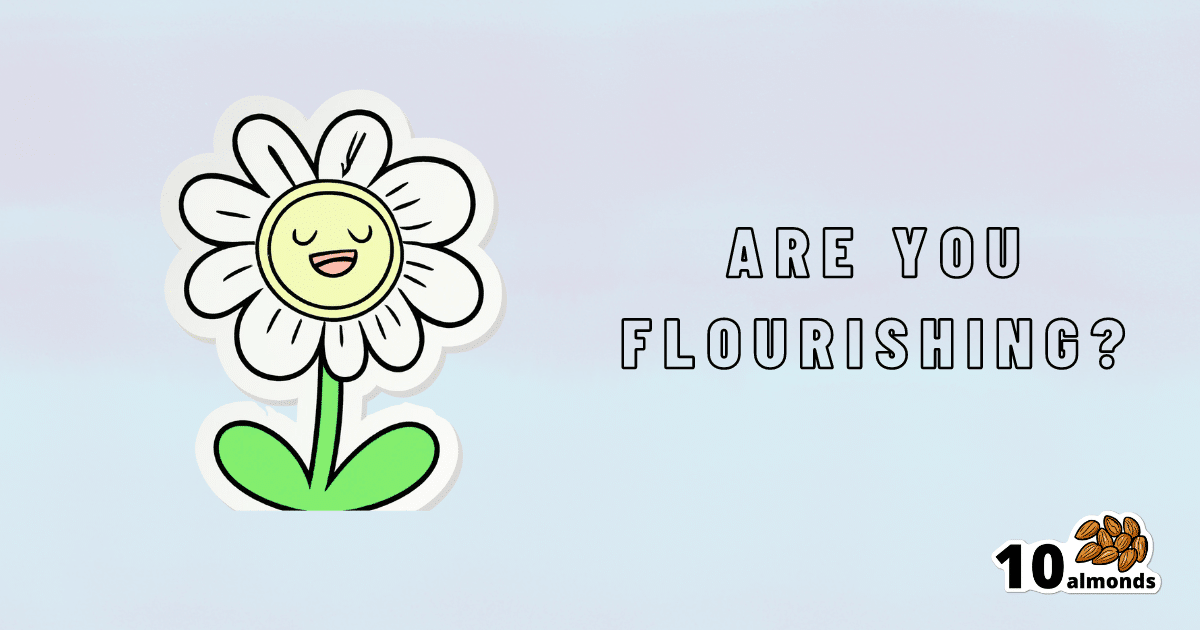Are You Flourishing? (There’s a Scale)
What does it mean to flourish? How can you do it more? Learn the keys to flourishing, including directing your attention, shaping your time, constant improvement, communication, and seeking positive experiences.

What does it mean, to flourish? And how can you do it more?
In 2009, psychologists Diener et al developed the “Flourishing Scale”, or as it was more prosaically called originally, “Subjective Wellness Scale”. The name was changed later, as it was noted that it went beyond what was typically considered mere “wellness”.
This scale was so useful, that colleagues scrambled to see if they could improve on it, such as with PERMA (2012), which looked at:
- Positive emotion
- Engagement
- positive Relationships
- Meaning
- Accomplishment/Achievement
While popular (despite the tenuous acronym, it is a very good list of things to foster in your life), this was studied and measured scientifically and found to not be an improvement on the Flourishing Scale / SWS, so we’re going to stick to the original version for now.
We couldn’t find an interactive online quiz for the scale though (apart from this NY Times one, which is paywalled for NYT subscribers, so enjoy if you’re a NYT subscriber!), so here’s the source material, still hosted on the website of the (now deceased, as of a couple of years ago) author:
Flourishing Scale (FS) ← it’s an eight-question, ranked choice scale
How did you score? And…
What are the keys to flourishing more?
According to Jeffrey Davis M.A., of Tracking Wonder, there are five key attributes that we must develop and/or maintain:
The ability to direct and re-direct your attention
This isn’t just a task-related thing.This is about your mind itself. For example, the ability to recognize what your emotions are telling you, thank them for the message, and then set them aside. Or the ability to cut through negative thought spirals! How often have you worried about future events that didn’t transpire, or twisted yourself in knots over a past event that you can’t change?
Action: check out our previous article “The Off-Button For Your Brain” ← this is a technique for switching off racing thoughts, and it’s really good
Want more? We also did this:
The tendency to shape your time with intention and for impact
Time is an incredibly precious asset. How you use it is a very personal choice. You don’t have to maximize productivity (though you can if you want), but for example there’s a difference between:
- Deciding to spend an hour watching a TV show you really enjoy
- Wondering what’s on TV, browsing aimlessly, watching listlessly, just a distraction
In the former case, you are enjoying your time. Literally: you are experiencing joy during your time.
In the latter case, to borrow from Jim Steinman, “you were only killing time and it’ll kill you right back”!
Action: do a time audit for a week, and see where your time really goes, rather than where you expect or hope for it to go. Use this information to plan your next week more intentionally. Repeat as and when it seems like it might be useful!
The practice of constant improvement
Fun fact: you are good enough already. And you can also improve. You don’t have to, but improving in the areas that are meaningful to you can really add up over time. This could be becoming excellent at something for which already have a passion… It could also be brushing up something that you feel might be holding you back.
Action: do a quick SWOT* self-assessment. Then plan your next step from there!
*Strengths, Weaknesses, Opportunities, Threats. What are yours?
The ability to communicate and listen to others
A lot of this is about feedback. Giving and receiving feedback are often amongst the hardest things we do in the category of communication… Especially if the feedback is negative. How to decide what to disregard as baseless criticism, and what to take on board (and try not to take it personally), or the other way around, how to present negative feedback in a way that won’t trigger defensiveness.
Action: check out our previous article “Save Time With Better Communication” for some tips that really make relationships (of any kind) so much easier.
The commitment to positive experiences
Many things in life are not fun. Often, we know in advance that they will not be fun. The key here is the ability to make the most of a bad situation, and seek out better situations by your actions. Not like a lost person in a desert seeks water, but like a chess player who employs a general strategy to make tactical advantages more likely to appear.
Action: think about something you have to do but don’t want to. How could it be made more fun? Or failing that, how could it be made at least more comfortable?
See also: Working Smarter < Working Brighter!
Want to read more?
Check out: What Is Flourishing in Positive Psychology? (+8 Tips & PDF)
Share This Post
Learn To Grow
Sign up for weekly gardening tips, product reviews and discounts.




